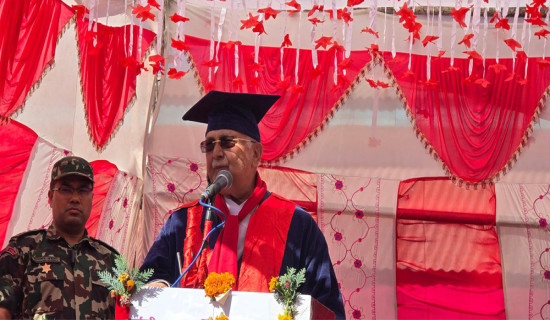- Wednesday, 13 November 2024
Sita Dahal: Life Devoted To The Nation
The nation has lost an exemplary woman warrior; a rare leader who remained steady in defeat and modest in victory; someone who never failed to encourage and motivate everyone around her. Maoist leader Sita Dahal, who always stood firm in her commitment to the country and the party, and inspired others for the same, has left us forever. She has shed her mortal coil, but has left a legacy that shall be remembered and discussed for long.
Named after the Ramayana’s principal female character, her noble, calm and dignified nature that reflected the name she bore, Sita, brought her to this great height. After her body started failing her, she sought treatments in Singapore in 2018, the United States of America in 2020 and India in 2021. Despite receiving a long treatment in the country too, ultimately death conquered and took away Sita, the heartbeat of Nepal’s women. This has left the Nepali women’s movement orphaned and the Maoist organisation wounded.
Her husband, who was thrust into prominence following the declaration of the People’s War, is currently leading the country as its prime minister for the third time. And Sita made sure that he never got into controversy because of her. Known as Comrade Shila and Jwala during the 10-year People’s War, Sita was crucial in advising Chairman Pushpa Kamal Dahal ‘Prachanda’ and solving the internal and external challenges that the party faced from time to time. Be it during the formation of CPN (Maoist) or the class struggle or line struggle of the underground period, she always stood on the side of the revolution and tried to unify the party in every possible way. Her efforts saw the revolutionaries through many storms, crises and catastrophes.
During the armed struggle, she was always the party’s guardian, doing everything in her power to solve crises and reconcile all sides. She used to unite the party around the common cause of class struggle by urging the top leadership to put their ideological differences aside.
During the cries and yells that resulted from the disagreements between General Secretary Prachanda and party leader Mohan Baidya ‘Kiran’, the back and forth between General Secretary Prachanda and senior leader Dr. Baburam Bhattarai regarding policy and leadership and the lack of coordination between General Secretary Prachanda and Organisation Head Ram Bahadur Thapa ‘Badal’, Comrade Shila played a great role in bringing everyone together. Even when all other roads to unity were blocked, she would convince the leaders and groups to come together in the party.
Sita played a great role in bringing back the Badal group that had initially split from the party with Mohan Vidya ‘Kiran’ but later rebelled against him. Similarly, she was extremely happy when the CPN (UML) and CPN (Maoist Centre) united into one party. She used to be the parent who had balanced and cordial relations with all leaders. Sita will always be revered for her contributions to the party during difficulties, support of her husband Chairman Prachanda and preparedness to overcome any challenge.
She was also called ‘mother’ and, seeing her love and devotion to the party and the country and the role she played during tough times, it is not hard to understand why. From the day of her marriage until her death, she not only stood as Prime Minister Prachanda’s life-partner but his charioteer.
She mobilised with CPN (Maoist) when the party started the People’s War in 1996. She was not able to speak when Prime Minister Prachanda assumed leadership of Nepal’s government for a third time, but the previous two times, leader Sita strongly motivated party leaders to work for the people. She always alerted Prime Minister Prachanda to give positions and appointments to leaders and cadres based on their abilities.
Suffering from a rare disorder progressive supranuclear palsy (PSP), Sita had been unconscious for two years. Grief-stricken with the loss of her daughter Gyanu Dahal to cancer, Sita began losing her strength after the passing of her only son Prakash Dahal. According to the Prime Minister’s Secretariat, more than 10,000 people had paid tribute to late Sita by Monday by garlanding her. Similarly, hundreds of different organisations have expressed grief in the condolence book. Hundreds have written condolence statements on the photos and paid tribute.
With her death, the people lost a mother, which is why they gathered in large numbers at the hospital, party office and the Pashupati Aryaghat where Sita was bid adieu with state honours. Representatives and envoys of the United Nations, the South Asian Association for Regional Cooperation (SAARC), the United States of America, the United Kingdom, Saudi Arabia, Myanmar, Japan, South Korea, Pakistan, Bangladesh, Australia, Brazil, North Korea, Egypt, Israel, Switzerland, Malaysia, Thailand, Germany, Finland, Sri Lanka and Russia, among other nations and bodies, met the Prime Minister and his family and paid respects to Sita as the ‘mother of the nation’.
Indian Prime Minister tweeted his condolences. US Assistant Secretary of State Donald Lu, during his one-day formal visit, said that Mrs. Dahal’s contributions to the nation would forever be remembered. Chinese Ambassador to Nepal Chen Song recalled her role in strengthening the friendship between the two countries and in the social and economic development of Nepal.
Speaker of the House of Representatives Devraj Ghimire, Chairperson of the National Assembly Ganesh Prasad Timilsina, Chief of the Army Staff Prabhu Ram Sharma, leaders of various political parties, chief of the Karnali Province Tilak Pariyar and Chief Minister Raj Kumar Sharma, Chief Minister of Bagmati Province Shalik Ram Jamkattel, Industrialist Binod Chaudhary and others extended their sympathies.
Similarly, former President Bidya Devi Bhandari expressed her belief that Sita Dahal, an ideal wife, mother and partner in her husband’s political journey, would forever be remembered for her contributions. The Sushil Koirala Memorial Foundation praised Sita as a remarkable mother who was able to raise four children during her husband’s underground life and armed rebellion.
Sita joined the communist movement in 1971 and played an important role in establishing the nation as an inclusive and secular federal democratic republic, and changing the society for the better. The dynamic, introverted and immensely kind Sita always acted as a bridge between the leaders, cadres and citizens. Her concrete and practical suggestions played no small part in making Prime Minister Prachanda who he is today.
“It is better to die fighting for a just society than to die doing nothing.”
The way she tried to make her life meaningful by being devoted to the country and the people rather than to luxury, comfort and opulence should be an example for us all.
(Maharjan is the Consulting Editor of Gorkhapatra Corporation.)
















